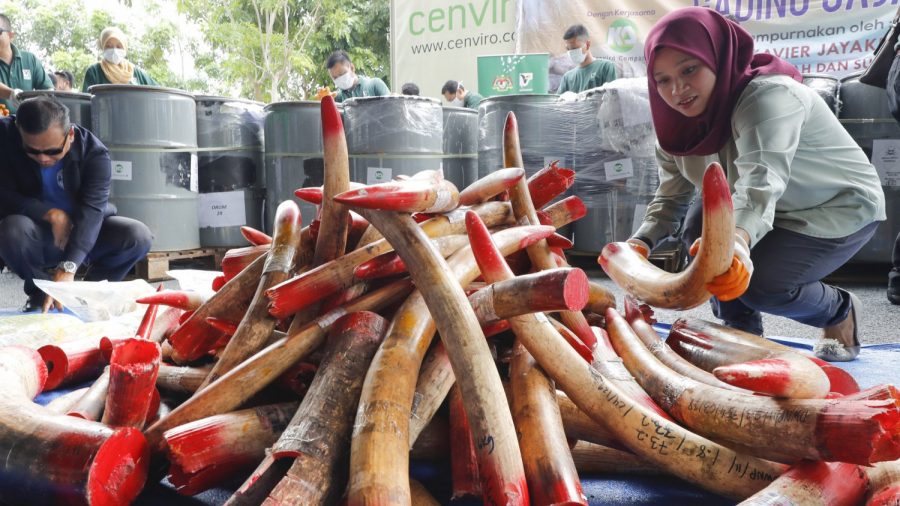SEREMBAN, Malaysia—Malaysia on Tuesday, April 30, destroyed nearly four tons of elephant tusks and ivory products estimated to be worth 13.26 million ringgit ($3.2 million) as part of its fight against the illegal ivory trade.
Water, Land and Natural Resources Minister Xavier Jayakumar said the ivory was confiscated in 15 raids between 2011 and 2017.
The tusks, which were marked, and products such as ivory bracelets and chopsticks were shown to reporters before they were to be thrown into a large incinerator in southern Negeri Sembilan state.
Jayakumar said the tusks and products were burned to ensure they wouldn’t be stolen and sold back in the black market.
He said Malaysia is committed to eradicating trading in illegal wildlife, especially in ivory, and to stop smugglers from using Malaysia as a transit hub.

This was the second time Malaysia has disposed of its tusk stockpile, after burning 9.5 tons worth some $20 million in 2016.
Ivory tusks are a cherished decorative craft material in Asia, with the biggest demand coming from China, resulting in the devastation of wild elephant populations in Africa.
“Making money off the opportunity to kill these animals for bragging rights is something that most people around the world find appalling,” Kitty Block, acting president and CEO of the Humane Society of the United States, said in a January 18 statement. “There is no place for trophy hunting in today’s world.”

Earlier in Feburary, Hong Kong seized a record 8.3 tons of pangolin scales and hundreds of elephant tusks worth more than $8 million combined, one of the largest of ivory in a decade.
Under Hong Kong law, the importation and sales of endangered species and their products can be punished by up to 10 years in prison and a fine of $1.3 million.

The world’s largest land mammal, the African elephant has been classified as threatened under the U.S. Endangered Species Act since 1979. A licensed two-week African elephant hunt can cost more than $50,000 per person, not including airfare, according to advertised rates.
Illicit demand for elephant ivory has led to devastating losses from illegal poaching as the natural habitat available for the animals to roam has also dwindled by more than half. As a result, the number of African elephants has shrunk from about 5 million a century ago to about 400,000 remaining. And that number continues to decline each year.
According to the United Nations, as many as 100,000 African elephants were killed between 2010 and 2012. For forest elephants, the population declined by an estimated 62 percent between 2002 and 2011.

